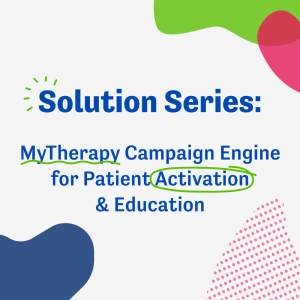Excellence in MLR: How to Unlock the Power of AI for Patient Communication
Read how AI supports experienced medical writers to identify topics, create content, and ensure MLR compliance to help execute an effective and impactful patient communication strategy for pharma

- AI streamlines content creation and MLR compliance, boosting efficiency in crafting precise medication adherence material
- Skilled medical writers bring empathy, creativity, and accuracy, addressing the emotional nuances of medication adherence
- Collaborative use of AI and human expertise ensures engaging, compliant, and personalized content for effective patient connection
Content that forms the backbone of pharma’s patient communication efforts must be carefully crafted if it is to have the desired impact, particularly when it comes to educational content that should support patients and help tackle issues such as non-adherence. A skilled and experienced patient-centric editorial team is irreplaceable when it comes to creating such content. In this article, we explore how Artificial Intelligence (AI) can support such teams in the creation of patient-facing content by increasing efficiency in areas including content creation and expediting processes such as Medical, Legal, and Regulatory (MLR) reviews.
3 Ways to Utilize AI for Patient Communication
1. Identifying Important Topics
AI plays a pivotal role in streamlining the process of identifying the most pertinent topics for educational content. By analyzing vast datasets, for example, AI tools can swiftly identify common concerns, misconceptions, and frequently asked questions regarding specific medications. This data-driven approach ensures that the content is tailored to address the real-world challenges patients face, providing valuable insights that may not be immediately apparent through traditional research methods.
Beyond using data to identify topics, well-written prompts for tools such as ChatGPT can be used to generate headlines or content outlines en masse. While some will be off the mark and others will need tweaking, the speed at which a large number of topics can be generated makes the process hugely efficient.
2. Creating Engaging Content
Once the key topics are identified, AI can be harnessed to create engaging and easily digestible content. Natural Language Processing (NLP) algorithms analyze patterns in language, enabling the generation of content that resonates with the target audience. This includes the crafting of clear and concise explanations, relatable anecdotes, and appealing visuals, fostering better comprehension and retention of information by patients.
Moreover, AI-driven tools can adapt content to individual patient preferences, ensuring a personalized and patient-centric approach. For instance, the platform can analyze patient interactions and feedback, tailoring content to resonate with diverse demographics, cultural nuances, and literacy levels, thereby increasing the likelihood of patients engaging with and internalizing the information.
3. Ensuring MLR Compliance
In the pharmaceutical industry, adhering to Medical, Legal, and Regulatory (MLR) standards is paramount. AI significantly expedites the MLR review process by automating the initial screening for compliance, flagging potential issues, and highlighting areas that may require human intervention. This not only reduces the burden on regulatory teams but also minimizes the risk of oversight, ensuring that content aligns with the stringent standards set by pharmaceutical partners.
While AI can facilitate the MLR process, it's crucial to emphasize that human expertise is indispensable in maintaining the highest standards of accuracy, relevance, and ethical considerations. A skilled team of medical writers brings a nuanced understanding of medical terminologies, patient perspectives, and regulatory nuances, providing the necessary human touch to the content creation process.
The Synergy of AI and Human Expertise
While AI streamlines the identification of topics, accelerates content creation, and aids in MLR compliance, it cannot replace the nuanced understanding, empathy, and creativity brought by human medical writers. A collaborative approach, where AI serves as a powerful tool, allows the content team to leverage the strengths of both technology and human expertise.
Experienced medical writers bring a level of empathy and understanding that is essential in addressing the emotional and psychological aspects of medication adherence. They can craft narratives that resonate with patients on a personal level, instilling a sense of empowerment and motivation to adhere to their prescribed treatments.
smartpatient’s Approach to Utilizing AI for Patient Communication
Here at smartpatient, we have embraced the integration of AI to amplify our medical writers’ impact. By leveraging AI for efficient topic identification, content creation, and MLR compliance checks, we adopt a “best of both worlds” approach that ensures the efficiency offered by AI does not come at the cost of the quality and accuracy that can only be achieved with an experienced content team.
This allows us to produce high-quality and impactful content for our partners in the pharma industry that helps them achieve their patient communication ambitions.
If you would like to discuss how you can benefit from an experienced, high-quality medical editorial team that utilizes the latest technical innovations, don’t hesitate to book a meeting.





